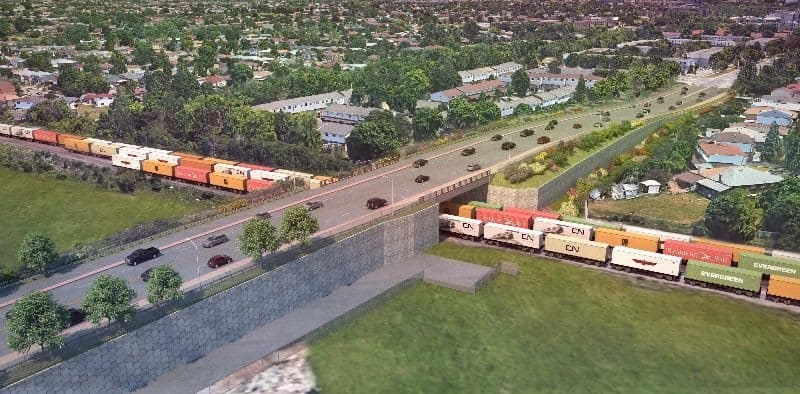lenaitch
Senior Member
The ROW from Sudbury to Ottawa (ish), was CP, so I assume they care more about their Belleville Sub than the CN Kingston Sub. Up until fairly recently, CP didn't go east of Montreal. The reacquired the route through northern Maine and can now get to Saint John. In terms of supply chain, traffic from the east coast has a greater need to get to southern Ontario than it does northern Ontario or the west.The northern route between Ottawa and Sudbury was abandoned and now when there is a disruption in the Kingston Sub there is no way to get to the east coast.
CN built a port at Prince Rupert to alleviate pressure at Vancouver. Maybe if they could build a port in the mouth of the ST Lawrence that would reduce strain on Halifax
It might, I don't know the capacity pressures on Halifax. One thing it won't do is have any impact on Pacific trade, which I would suspect is much higher. The "mouth of the St. Lawrence" is very isolated and rugged. Extending any kind of high capacity connected infrastructure would be quite challenging. Promotors have pushed for a container port at Sydney NS and I saw a proposal for some kind of port and rail connection I think east of the Saguenay. Both would be pretty much greenfield, cost billions and, in my view, not a good use of my tax dollars.
A key takeaway is that CN built out the Price Rupert terminal, not the taxpayer.
What "northern route" do you mean? The other post referenced the former CP Ottawa Valley route. Do you mean the former National Transcontinental/Grand Trunk route through northern Quebec. It was a money loser from just about the day it opened. Both CN and CP marshal their eastern trains through the GTA. Why would CN want to go the Quebec City?The northern route would absolutely be my first choice for strategic redundancy. Followed by a new mountain crossing as bottleneck relief; restoring CPs southern route seems attractive in terms of reusing corridors, but maybe not in an ideal location from a network perspective….
Many forget how much both CN and CP freight traffic from the west is routed through the US and pretty much has to come back in at Ontario.
The only specific infrastructure called out is a road - twinning Hwy 185 between QC and NB. There are some interesting observations about things like making full use of container capacity on the St Lawrence, and changes at ports to make containers move through more quickly, and vague references to rail capacity improvements, but a recurring theme is how limited the effect of capital improvements is when labour shortages are a significant issue, whether in the industry itself or federal bodies such as CBSA and CTA. The supply chain is a chain, and if you make one link titanium it only helps so much when the next ring is made of rolled up tinfoil.
that said, this is a report by industry types - the mention of a four year regulatory examination of the Milton intermodal terminal makes no mention to the degree to which the proponent took something sizeable on without receiving local community buy-in.
Quebec has been milking that stretch for years, claiming that it is more of a federal responsibility since it benefits Canadians more than Quebecers.
The one proposal I found interesting is to allow containers to move off marine terminals 'in bond' to clear congestion. That would essentially move customs clearance inland and would require the cooperation of CBSA and possibly some regulatory changes. From my non-expert perspective, it seems to make sense.





